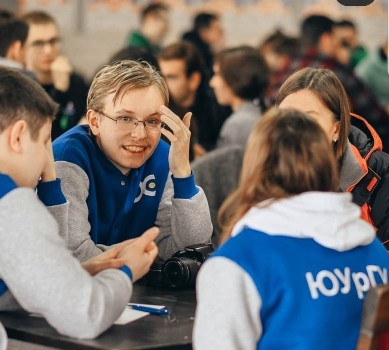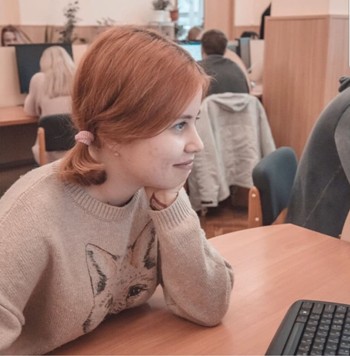Philology is one of the ancient sciences that shaped the bases for various fields of humanitarian activities. That is why a philologist is a profoundly educated polymath, who speaks several languages, knows the world literature and culture, and can create different types of texts and use them for a wide range of activities: from teaching to legal sphere.
You can obtain the knowledge in the field of applied philology at the Department of the Russian Language and Literature of the SUSU Institute of Media, Social Sciences and Humanities. Head of the Department, Doctor of Sciences (Philology), Professor Tatiana Semyan gives the following characteristics to the new processes under way in modern philological knowledge: “While still at school, everyone heard about Dmitry Likhachov as of a person who studied the first Russian literary monument, The Tale of Igor's Campaign. He used to say that “Philology is the ultimate form of the humanitarian education, a framework that binds together all the humanitarian sciences”. I believe that we should give credence to the person, whom our people and our history remember as a keeper of our culture's spiritual values. Once you become a philologist, you will discover broad perspectives for your future professional activity since today the humanitaristics is becoming an important aspect in all kinds of spheres, including the newest field of digitalization. The coined concept of Digital Humanities recognizes the role and significance of the humanities in modern world and is based on the fundamentals of philological knowledge, on the capability of creating texts, on the skills of searching for and understanding the literature required namely for your field of activity”.
The Department of the Russian Language and Literature of the Institute of Media, Social Sciences and Humanities was established in 2000. Among its staff members are 3 doctors of sciences and 9 candidates of sciences, who provide students with modern philological education, which combines the classical traditions and new digital competences. Today the philology students in their training enjoy new relevant opportunities that have opened thanks to the trends of the modern digital era. These include the necessity to create, analyze and expert-review texts for web-sites, blogs, etc., and to study the visual elements of texts; the possibility to create web-site content, and fulfil virtual literary projects.


Our Department offers the complete course of the higher philological education within the main three levels of studying.
As the first level of higher education, Bachelor's degree programme 45.03.01 in Philology offers you to major in Applied Philology. Bachelor's degree programme implies full-time studies on a state-funded or contract basis lasting for 4 years.
Requirements: entrance examinations in Literature (Unified State Examination), Russian Language (Unified State Examination), and an essay (SUSU examination).
A holder of the Bachelor's degree in Philology obtains competences in publishing and literary activities, as well as in the spheres of education, science, media, and mass communications. Any of our graduates could work as a literary editor, proofreader, literary and theatre critic, Literaturträger (bearer of literary culture as translated from German), research fellow, teacher in a higher educational institution, teacher of Russian language and literature, copywriter, speechwriter, or content manager.
Students obtain broad-based knowledge and professional skills in the process of studying various subjects: Russian Language; Culture of Spoken Russian; Applied Aspects of Philology in Mass Media; Media Text in the Context of Convergence and Copywriting; and History of Russian and Foreign Literature. The Department pays special attention to the linguistic training: besides the popular foreign languages (English, German), the philologists of the SUSU Institute of Media, Social Sciences and Humanities learn the specifics of the Polish and Bulgarian languages. Thus, the Philology programme is a good basic education that allows our graduates fulfil their potential in very different spheres.
As the second level of higher education, Master's degree programme 45.04.01 in Philology with the major in Text Creation, Analysis and Expert Review implies full-time studies on a state-funded or contract basis lasting for 2 years.
To enrol with the Master's programme, you must pass the Master's programme examinations (SUSU examination in two blocks) in the form of computer-based testing, as well as the examination in Russian Literature.
A Master's programme graduate obtains competences in applied, project, scientific-research and Culturträger (bearer of culture as translated from German) activities. A holder of the Master's degree in Philology is capable of creating and expert-reviewing any genre- and style-related type of text; fulfilling the complete cycle of a project, including that of a digital one; working as a scientist and as a teacher; organizing events in the field of humanities; and creating and moderating humanities projects in the Internet environment.
The Master's programme studies include the following profession-related subjects: Genre- and Style-specific Text Analysis; Linguistic Expert Review of Texts; Classical Text Analysis; Non-classical Text Interpretation; Philological Support of Project Activities; and Internet Text and Media Text Workshop.
As the third level of higher education, we offer postgraduate studies in 10.01.01 Russian Literature.
This stage also implies full-time studies on a state-funded or contract basis lasting for 3 years. The requirements include: entrance examinations in Philosophy (SUSU postgraduate examination), Foreign Language (SUSU postgraduate examination), and Specialization Subject (SUSU postgraduate examination).
A postgraduate who completes the studies under the programme in Russian Literature becomes prepared for scientific and teaching activities in higher school, as well as to heading and organizing grants-related activity.
The Department of the Russian Language and Literature actively participates in the project-based learning and elite training programmes being offered at South Ural State University.
At our Department the Master's degree programme can be fulfilled with the use of project-based learning technologies. While studying under the Master's degree programme, students create a web-site of the Virtual Museum of South Ural Writers. This is the only project in modern Russian culture that is devoted to regional literature, and thanks to which you can not only learn the biographies of writers and poets of the Ural region, but also visit their workshops by taking a virtual tour around their museum-status study-rooms. The relevant format of project-based learning provides our students with practical skills in project activity organization, and creation of a web-site, from its design and to its content. Master's degree students of our Department work as literary secretaries of the writers, and create the texts and visual content for different social media formats.

Our Department offers students to additionally master the elite training programmes in: the Art of Public Speaking; Scientific Speech Workshop; Modern Russian Literature, and more.
Also students of the Department of the Russian Language and Literature enjoy an opportunity to participate in annual special projects: work of the editorial board of the SlavicumPress, an online journal of the Institute of Slavonic Studies at the University of Zurich; Akuly PеRа (News Tribe) business game; Divan, an online journal about literature and culture by philology students; Philology Games, a team game for senior school pupils and students; and SUSU Philology as the Philology of the Future, a project of the Department's promotion and positioning. Projects become the basis for certain educational courses, and the material for defending the graduation qualification papers.
Our students learn how to present their projects and research achievements at the annual International Conference for Young Scientists on Language. Culture. Communication, among the participants of which are the Department's academic partners: Institute of Slavonic Studies at the University of Zurich; Institute of Philology, Journalism and Intercultural Communications of Southern Federal University, Rostov-on-Don; Department of Social and Humanities, and Philosophical Disciplines of Sochi State University; Department of Russian and Foreign Literature of Samara University, and more.
Among the employers of our Department's graduates are well-known regional companies and enterprises: OOO Intersvyaz company; State Enterprise Regional Television Broadcasting Company of the Chelyabinsk Region; Yuzhny Ural State Television and Radio Broadcasting Company; OOO Studiya Internet Tekhnologiy (Internet Technology Studio); SUSU Publishing Centre; OOO Tsentr Soprovozhdeniya 1С-Rarus Chelyabinsk support centre; Regional Centre for Additional Education of Children; Apple Store Russia and CIS Countries; Unified State Archive of the Chelyabinsk Region; OOO Izdatelstvo Arkaim publishing house, and more.
Thus, in the modern world, philology becomes a multi-purpose basic knowledge that is in demand. A philologist with the skills of practical work with different types of text is an indispensable specialist in the humanities fields related to the processes of communication.
For enquiries, call at: +7 (351) 267-90-29, Director's Office of the SUSU Institute of Media, Social Sciences and Humanities.





.JPG)